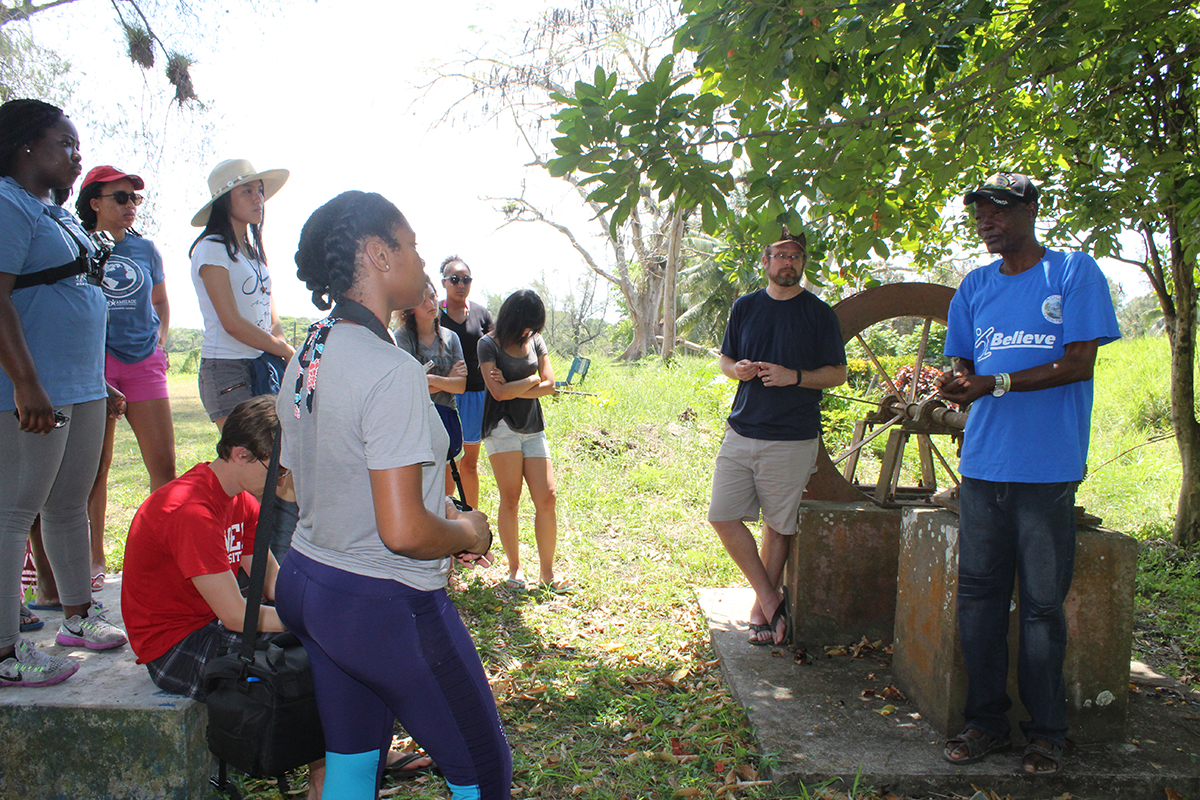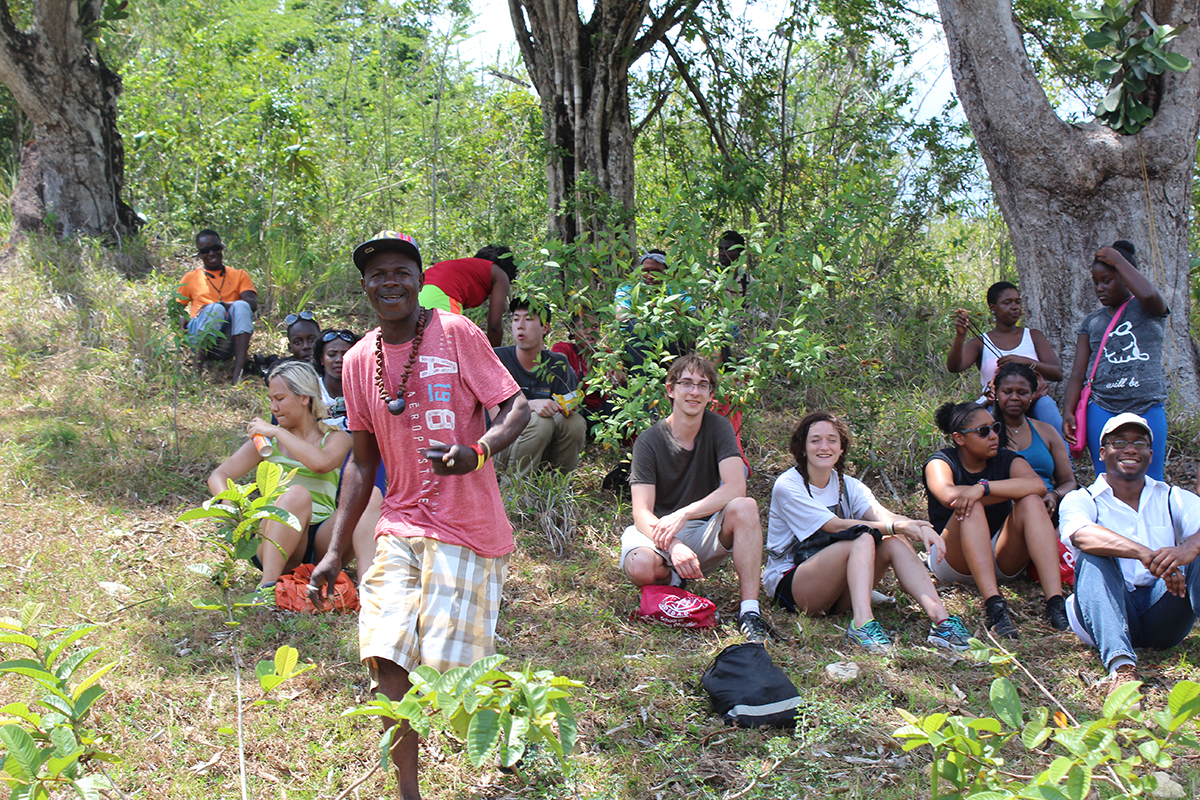Impact of service learning in Jamaica 'goes both ways'
By Daniel Aloi

A week in Jamaica offered more than a vacation for a group of Cornell students this semester.
As part of professor of history Edward Baptist’s course Understanding Global Capitalism through Service Learning, the class lived and worked over spring break in rural Petersfield, in Westmoreland parish, about an hour from Negril.
“For hundreds of years the backbone of the community has been sugar,” Baptist said. “One of the biggest sugar refineries in Jamaica and the world” is nearby, and “in 1935, a labor conflict at that refinery launched the Jamaican independence movement.”
Working with community partner the Association of Clubs (AOC) in Petersfield and with U.S. nonprofit Amizade, the 17 students lived for a week with local host families; worked alongside community members on service projects such as building sidewalks and painting walls, renovating playgrounds and bus stops; and assisted in schools and at community centers.
“Our students actually do some good in the classroom, some that have 40 or 50 students,” Baptist said. “Just having more adults with one teacher in the room can have some results. It’s a positive impact that goes both ways. It’s through these human relationships that you learn, being side by side.”
The week in service helps students to see global economics historically through one community.
“For a while Jamaica was the crown jewel of the British empire before it got hold of India,” Baptist said. “It was the most important sugar-producing slave plantation colony in the world. … After emancipation, a lot of Jamaicans fled sugar work but workers were pushed back into it by economic conditions 80 years later.”
Today, he said, “the Jamaican economy hasn’t seen any real growth since the 1970s. It’s been really affected by global forces.”
“We spent the first half of the semester talking about that history, from slavery to emancipation to the revival of sugar to the advance to this neoliberal world economy at which Jamaica finds itself at the bottom,” Baptist said. “For the most part I don’t think they really get it until we go to Petersfield. They see people working, who at the same time don’t have many of the things our students take for granted.”
Biology and society graduate Elsie Ikpot ’15, a post-baccalaureate public health fellow at Gannett Health Center, took the 2015 course for credit and returned this year, staying with the same host family.
“We got to see everything we learned about in class; and the trip makes it a more real and in-your-face experience,” she said. “Seeing the sugar cane workers, learning more about the Chinese Jamaicans and Indians who came and opened different businesses. More personally, my host family, from May to September, has to travel outside of their city or the country to find work.”

The AOC grew out of a sugar workers’ cooperative and, as an umbrella for neighborhood organizations, works with Cornell and several other universities coordinating service visits.
“These kinds of classes are important economically to that community,” Baptist said. “Part of the program fee goes to the house mothers providing the homestay, who have to put back into a micro-lending fund. It gets money circulating in the community, and people coming there not only see Jamaica, but a different view of the place.”
Community members are glad to “share their rich culture,” Ikpot said. “Everyone is happy, so high-spirited. We learned so much about their culture – their music, their religion, their food.”
This is the third year for the service learning course, which is aligned with Engaged Cornell and Cornell Abroad. Students raise funds for the trip, also supported by the Mario Einaudi Center for International Studies, the Cornell Public Service Center and Department of History.
Baptist said some students prepared video final projects to “help preserve the experience.” He wants to develop a three-week January course, and “we hope the next time to be doing some kind of oral history project through the community partners.”
Communication major Grace Lyman ’18 had some familiarity with the culture from five summers spent working alongside Jamaican migrant workers in her family’s orchard in Connecticut.
“Their unwavering work ethic and appreciation for the natural world ultimately became the subject for my college essay and my inspiration for taking Ed’s class,” she said.
In Petersfield, however, “the circumstances were not quite as happy. The cane cutters were essentially working on commission, being paid per ton and making no more than $30 a day. Because labor rights are virtually nonexistent, much of their wage is dictated by the price of sugar on the world market,” Lyman said. “I then got to thinking about my friends on the farm, and realized their annual migration to the United States is not one of choice, but out of economic necessity. … Moreover, the brief moments I spent in the sugar cane field taught me infinitely more than a semester’s worth of lectures in an auditorium.”
Media Contact
Get Cornell news delivered right to your inbox.
Subscribe